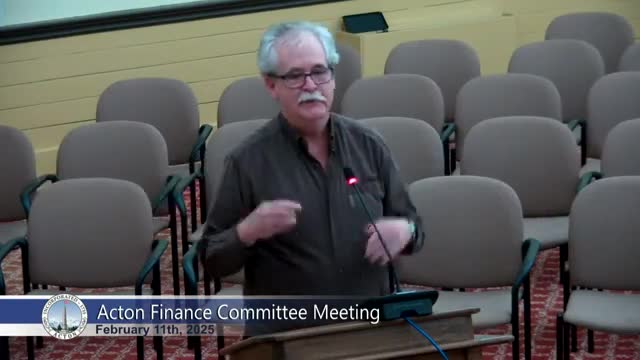Finance committee urges 3% operating cap, flags reserve risk and municipal cuts
Get AI-powered insights, summaries, and transcripts
Subscribe
Summary
Acton’s Finance Committee reviewed the ALG budget spreadsheet, recommended a 3% operating-growth guideline, flagged reserve erosion if free cash is used, and asked municipal departments to identify roughly $768,000 in reductions to reach the committee’s target.
The Acton Finance Committee told staff and department liaisons it expects municipalities to target no more than a 3% year-to-year operating increase and warned that the town’s reserves (free cash/rainy-day funds) would fall below preferred levels in out years under the current model.
Committee members said the ALG spreadsheet shows the municipal operating side projecting a 4.9% increase for the coming year and recommended reducing the municipal-side increase by about $768,000 to meet the committee’s 3% guideline. "If we are saying the total town is at X, ... we're looking for them to cut $637,337 as well as the $130,758 that we are currently in the hole," a committee member explained in live calculations.
The committee discussed drivers of pressure on budgets: higher-than-expected health insurance cost projections (cited as pushing medical rates up by several percentage points), the Minuteman assessment and uncertainty over roughly $1.7 million in federal school funds the district flagged as at risk. Members noted the ABRSD (Acton-Boxborough Regional School District) initial vote included a contingency for uncertain state and federal aid and that final assessments may change later in the budget cycle.
Reserve management featured repeatedly. The committee reiterated a policy preference for a roughly 3% floor for free cash/reserves and said the current plan would reduce reserves to around two-thirds of 1% in out years if no corrective action is taken. Members discussed model assumptions about annual "turnbacks" (unspent appropriations returned at year-end) and whether to include a conservative turnback assumption in future-year projections.
Several members suggested specific near-term tactics to reduce the municipal-side gap: incorporate realistic vacancy timelines and delayed hires, identify non-core services for restructuring or elimination over time, and search for additional recurring revenue. The committee also discussed the nursing/home-health service, which several members noted was historically run in enterprise-fund style and continues to have near-self-funded revenue but may merit future review; they declined to pursue that change this budget cycle.
During the meeting the committee reviewed changes in the ALG spreadsheet (Minuteman assessment decreased, ABRSD estimate increased) and queried the town manager’s office about sensitivity to tariff-driven material-cost shocks for capital projects.
A motion to approve the January 14 meeting minutes passed by voice vote at the end of the session.
Why it matters: Operating-budget growth and reserve levels determine the town’s capacity to absorb future shocks (health-insurance spikes, capital borrowing) without seeking new operating overrides from voters.
Quotes from the meeting included finance committee members urging clear guidance: "We recommend you get to 3%," one member said; another added, "We can't be doing more than 3%." Committee members asked municipal departments to identify about $768,000 in reductions or equivalent recurring revenue to align the municipal numbers with the committee’s target.
Ending: The committee tasked its liaisons and staff to press municipal cost centers to attempt to meet the 3% operating guideline and to return with revised figures; committee members said they will convey the committee’s preference strongly at the ALG meeting the following morning.
